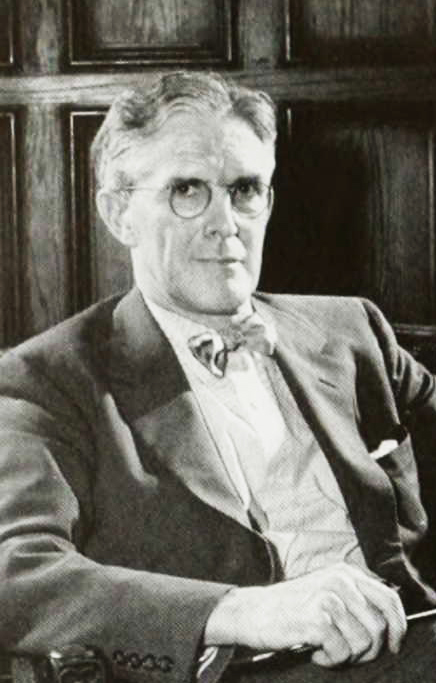Dr. Smyth was author of the Federal Government's official report on the development of the atomic bomb, ''Atomic Energy for Military Purposes,'' which was made public shortly after the atomic bombings of Hiroshima and Nagasaki in 1945. Directly or indirectly, most Americans got their first in-depth look at the atomic age through his work, popularly known as the Smyth Report.
Dr. Smyth strongly believed that people had to know the facts of atomic energy and the bomb to be able to make wise decisions concerning the revolutionary new force. His report was an account of how scientists overcame staggering problems of physics and engineering to develop the bomb. Served on Commission
He was associated with the atomic bomb project from its earliest days and served from 1943 to 1945 as a special consultant to the Manhattan Engineer District, the official name of the project.
Dr. Smyth served on the Atomic Energy Commission from 1949 to 1954, and in 1961 was appointed by President John F. Kennedy as the United States Representative to the International Atomic Energy Agency with the rank of ambassador. He held the post until 1970.
He was born May 1, 1898, in Clinton, N.Y. From the age of 7, when his father, Charles H. Smyth, joined the faculty of Princeton University as professor of geology, he spent most of his life at the university.
He graduated from Princeton in 1918, and earned his master's and doctoral degrees in physics there. He joined the Princeton faculty in 1924 as a physics instructor, later becoming a full professor and chairman of the university's physics department. He retired in 1966, becoming professor emeritus of physics. Opposition to Secrecy
Dr. Smyth believed in the importance of a free exchange of scientific ideas in a free society. In 1945 he urged that the United States ''do away with secrecy'' relating to information on atomic energy that was not directly concerned with the making of atomic bombs.
He also proposed that the United States, Great Britain and the Soviet Union help establish an international partnership to develop peacetime uses of atomic energy and prevent its use as an instrument of destruction.
Months after the end of World War II, he warned that any nation could make atomic weapons ''within a few years,'' and that ''in all probability no adequate defense can be developed against atomic weapons.''
He repeated that warning again last year at Princeton, speaking out against President Reagan's proposed space-based missile defense system.
Dr. Smyth is survived by his brother, Charles Phelps Smyth of Princeton, a former professor of chemistry at Princeton University.
A memorial service is to be held in Princeton at a later date.
Biography courtesy of New York Times
Dr. Smyth was author of the Federal Government's official report on the development of the atomic bomb, ''Atomic Energy for Military Purposes,'' which was made public shortly after the atomic bombings of Hiroshima and Nagasaki in 1945. Directly or indirectly, most Americans got their first in-depth look at the atomic age through his work, popularly known as the Smyth Report.
Dr. Smyth strongly believed that people had to know the facts of atomic energy and the bomb to be able to make wise decisions concerning the revolutionary new force. His report was an account of how scientists overcame staggering problems of physics and engineering to develop the bomb. Served on Commission
He was associated with the atomic bomb project from its earliest days and served from 1943 to 1945 as a special consultant to the Manhattan Engineer District, the official name of the project.
Dr. Smyth served on the Atomic Energy Commission from 1949 to 1954, and in 1961 was appointed by President John F. Kennedy as the United States Representative to the International Atomic Energy Agency with the rank of ambassador. He held the post until 1970.
He was born May 1, 1898, in Clinton, N.Y. From the age of 7, when his father, Charles H. Smyth, joined the faculty of Princeton University as professor of geology, he spent most of his life at the university.
He graduated from Princeton in 1918, and earned his master's and doctoral degrees in physics there. He joined the Princeton faculty in 1924 as a physics instructor, later becoming a full professor and chairman of the university's physics department. He retired in 1966, becoming professor emeritus of physics. Opposition to Secrecy
Dr. Smyth believed in the importance of a free exchange of scientific ideas in a free society. In 1945 he urged that the United States ''do away with secrecy'' relating to information on atomic energy that was not directly concerned with the making of atomic bombs.
He also proposed that the United States, Great Britain and the Soviet Union help establish an international partnership to develop peacetime uses of atomic energy and prevent its use as an instrument of destruction.
Months after the end of World War II, he warned that any nation could make atomic weapons ''within a few years,'' and that ''in all probability no adequate defense can be developed against atomic weapons.''
He repeated that warning again last year at Princeton, speaking out against President Reagan's proposed space-based missile defense system.
Dr. Smyth is survived by his brother, Charles Phelps Smyth of Princeton, a former professor of chemistry at Princeton University.
A memorial service is to be held in Princeton at a later date.
Biography courtesy of New York Times
Family Members
Sponsored by Ancestry
Advertisement
Advertisement








